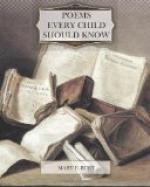LITTLE ORPHANT ANNIE.
“Little Orphant Annie” certainly earns her “board and keep” when she has “washed the dishes,” “swept up the crumbs,” “driven the chickens from the porch,” and done all the other odds and ends of work on a farm. The poet, James Whitcomb Riley (1853-), has shown how truly a little child may be overtaxed and yet preserve a brave spirit and keen imagination. Children invariably love to learn this poem.
Little Orphant Annie’s
come to our house to stay,
An’ wash the cups and
saucers up, an’ brush the crumbs away,
An’ shoo the chickens
off the porch, an’ dust the hearth, an’
sweep,
An’ make the fire, an’
bake the bread, an’ earn her board-an’-keep;
An’ all us other children,
when the supper things is done,
We set around the kitchen
fire an’ has the mostest fun
A-list’nin’ to
the witch-tales ’at Annie tells about,
An’ the Gobble-uns ’at
gits you
Ef
you
Don’t
Watch
Out!
Onc’t they was a little boy
wouldn’t say his pray’rs—
An’ when he went to bed at night, away up-stairs,
His mammy heerd him holler, an’ his daddy
heerd him bawl,
An’ when they turn’t the kivvers down,
he wasn’t there at all!
An’ they seeked him in the rafter-room,
an’ cubby hole, an’ press,
An’ seeked him up the chimbly flue, an’
ever’-wheres, I guess;
But all they ever found was thist his pants an’
roundabout!
An’ the Gobble-uns’ll git you
Ef you
Don’t
Watch
Out!
An’ one time a little girl
‘ud allus laugh an’ grin,
An’ make fun of ever’ one, an’
all her blood-an’-kin;
An’ onc’t when they was “company,”
an’ ole folks was there,
She mocked ’em an’ shocked ’em,
an’ said she didn’t care!
An’ thist as she kicked her heels, an’
turn’t to run an’ hide,
They was two great big Black Things a-standin’
by her side,
An’ they snatched her through the ceilin’
’fore she
knowed what she’s about!
An’ the Gobble-uns’ll git you
Ef you
Don’t
Watch
Out!
An’ little Orphant Annie
says, when the blaze is blue,
An’ the lampwick sputters, an’ the
wind goes woo-oo!
An’ you hear the crickets quit, an’
the moon is gray,
An’ the lightnin’-bugs in dew is all
squenched away,—
You better mind yer parents, an’ yer teachers
fond an’ dear,
An’ churish them ‘at loves you, an’
dry the orphant’s tear,
An’ he’p the pore an’ needy
ones ’at clusters all about,
Er the Gobble-uns’ll git you
Ef you
Don’t
Watch
Out!
JAMES WHITCOMB RILEY.
O CAPTAIN! MY CAPTAIN!
“O Captain! My Captain!” by Walt Whitman (1819-92), is placed here out of compliment to a little boy aged ten who wanted to recite it once a week for a year. This song and Edwin Markham’s poem on Lincoln are two of the greatest tributes ever paid to that hero.




